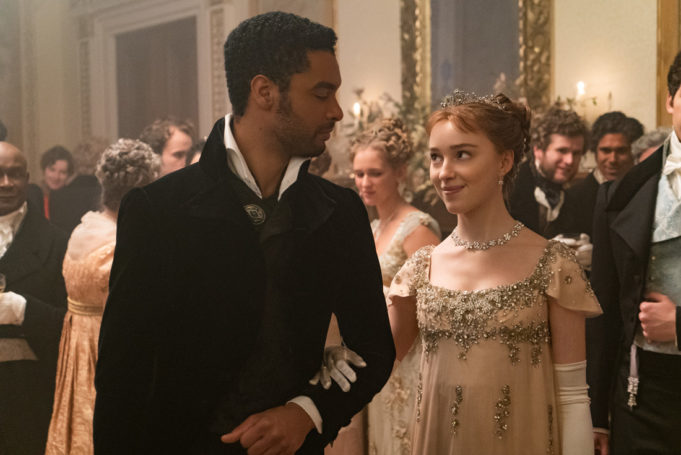In a recent movie review, I mused that ancient British baronial estates are not known to be welcoming to Black people. One of the provocative things that Netflix’s new period romance Bridgerton does is ask, “What if Black people owned those estates?” This bodice-ripper set in England’s Regency period sets out to do more than that, which is likely one reason why it’s turning out to be the hit show of the season.
Race is the first of many liberties the show takes with the series of Julia Quinn novels that it’s based on. There is some historical evidence that Charlotte, the real-life British queen during 1813, had some African ancestry, so the series constructs an alternate version of history where the queen (Golda Rosheuvel) is a Black woman who has elevated a number of other Black families to the ranks of the nobility. The main family, however, is of white nobles named Bridgerton. The father of the eight Bridgerton kids is dead, so stick-in-the-mud eldest brother Anthony (Jonathan Bailey) is in charge of finding a husband for his oldest sister Daphne (Phoebe Dynevor) when she comes of age. He’s never made matches before, which is why he’s so bad at it. On the verge of becoming a social pariah, Daphne meets Anthony’s friend Simon, the Duke of Hastings (Regé-Jean Page), a smoldering Byronic type who has vowed never to marry despite every eligible woman wanting him. Simon’s the one who proposes a sham courtship with Daphne to make her more attractive to men while discouraging female attention from himself. They’re good enough at faking love to fool the Gossip Girl of this social set, an anonymous self-published writer using the pen name of Lady Whistledown (voiced by Julie Andrews).
What’s the game here? The social norms here are familiar to anyone who’s read a Jane Austen novel, but this series has both people of color and way more sex (especially in the sixth episode). At social balls, musicians in powdered wigs and waistcoats play string-quartet covers of Billie Eilish and Ariana Grande. The show deserves credit for not casting the actors of color willy-nilly, the way other recent British dramas have done. If no white characters talk about race here, it makes sense that anyone harboring racial prejudice would keep quiet about it with a Black woman on the throne. There is a general sense that the noble Black families are the nouveau riche, and if the show were to expand on this in upcoming seasons, it would definitively improve on the books.
That said, I kept waiting in vain through the first episode’s eight seasons for the characters’ race and the music to snap the historical drama into focus, the way it did for the stage musical Hamilton. The spectacle of women of all stripes falling over one another trying to land the rich, handsome Black man is something that British prestige TV hasn’t given us before, but the writers can’t quite demonstrate how the London ton in the 19th century is similar to the dating scene now. Bridgerton’s directors inject a proper amount of fizz into the proceedings, but they’d be helped by snappier writing. As annoying and self-satisfied as I’ve found Downton Abbey to be, that show’s writers bring the funny lines.
The show does have the high level of acting you expect from a British import, with Page doing well by a tortured man with a traumatic childhood. The talent runs deep, too — the show’s fans are justly lining up behind the character of the Bridgertons’ neighbor Penelope (Nicola Coughlan), an overlooked fat girl who’s often smarter than the room, but I have a soft spot for Daphne’s younger sister Eloise (Claudia Jessie), who watches Daphne go through all the societal rituals for a woman seeking a match and decides she wants no part of that for herself. The show’s treatment of sex does yield some conversation fodder, like a sex scene between Daphne and Simon where both parties do some detestable stuff, or when an incel of a lord (Jamie Beamish) tries to rape Daphne and Anthony believes the accusation against him only when it’s leveled by another man. More consistently pointed commentary like this would turn Bridgerton from a pleasurable item of interest into a truly great show.












